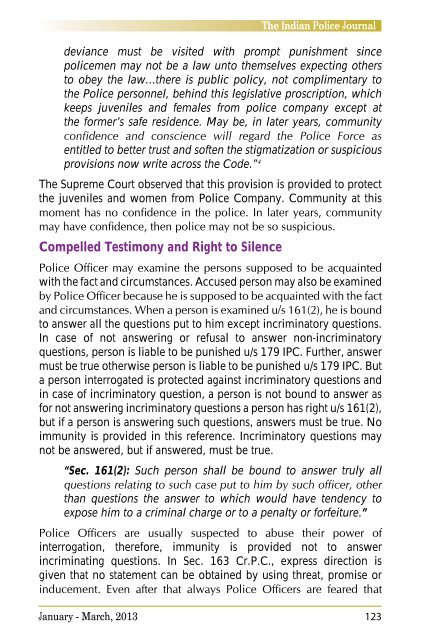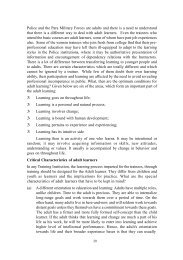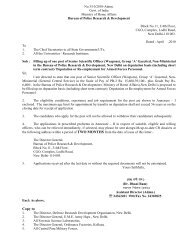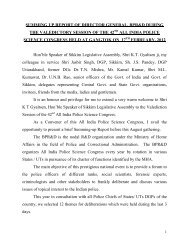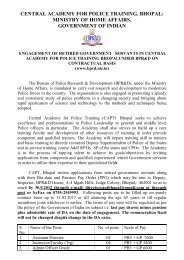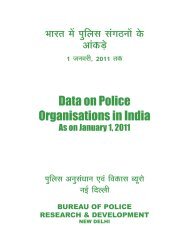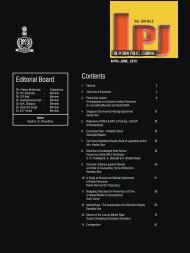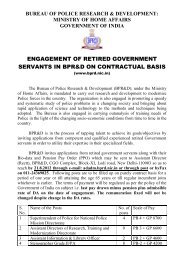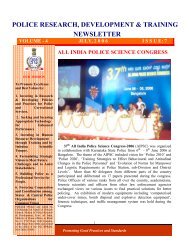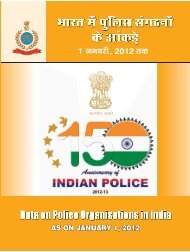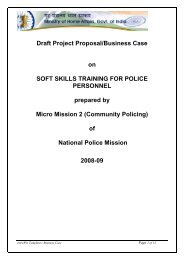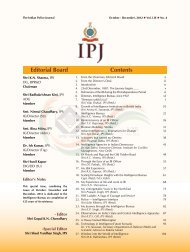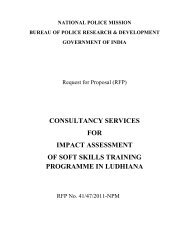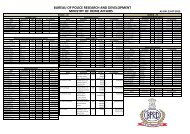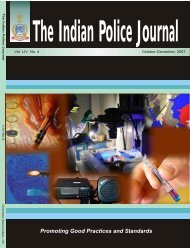- Page 5 and 6:
The Indian Police JournalIn this co
- Page 7 and 8:
The Indian Police JournalIndian Arm
- Page 9 and 10:
The Indian Police Journalbecome nec
- Page 11 and 12:
The Indian Police Journalis impleme
- Page 13 and 14:
Abjure Third DegreeThe Indian Polic
- Page 15 and 16:
The Indian Police Journalin enforce
- Page 17 and 18:
Good Governance andPolice Administr
- Page 19 and 20:
The Indian Police JournalDuring the
- Page 21 and 22:
The Indian Police Journalfailing to
- Page 23 and 24:
The Indian Police Journalpoliceman
- Page 25 and 26:
The Indian Police Journalare accoun
- Page 27:
Time for Stakeholdersto help mitiga
- Page 30 and 31:
The Indian Police Journalpurposes .
- Page 32 and 33:
The Indian Police Journalgoals. Put
- Page 34 and 35:
The Indian Police Journalpresent an
- Page 36 and 37:
The Indian Police JournalProblems o
- Page 38 and 39:
The Indian Police Journalmany appli
- Page 40 and 41:
The Indian Police Journalwhich capi
- Page 42 and 43:
The Indian Police JournalReferences
- Page 44 and 45:
The Indian Police Journalthat the c
- Page 46 and 47:
The Indian Police Journalbut also e
- Page 48 and 49:
The Indian Police JournalThe techni
- Page 51 and 52:
The Indian Police JournalIn Rudal S
- Page 53 and 54:
The Indian Police Journal
- Page 55 and 56:
The Indian Police Journalvictim's r
- Page 57 and 58:
The Indian Police Journal• Loss o
- Page 59 and 60:
Fire in ForestTackling Maoist Menac
- Page 61 and 62:
The Indian Police Journaland slight
- Page 63 and 64:
The Indian Police Journalfavour; an
- Page 65 and 66:
V. A Strategy of SuccessThe Indian
- Page 67 and 68:
The Indian Police JournalRights) Ac
- Page 69 and 70:
The Indian Police Journal of f
- Page 71 and 72:
The Indian Police JournalThe Govern
- Page 73 and 74: The Indian Police Journalsystem of
- Page 75 and 76: The Indian Police Journal(a usual t
- Page 77 and 78: The Indian Police Journalthe Therma
- Page 79 and 80: The Indian Police JournalTraining a
- Page 81 and 82: The Indian Police Journaltheir disp
- Page 83 and 84: The Indian Police Journal as
- Page 85 and 86: The Indian Police Journalparties, a
- Page 87 and 88: The Indian Police Journalafter hear
- Page 89 and 90: The Indian Police JournalA Flow Cha
- Page 91 and 92: Types of Disputes (2004 - 2011)The
- Page 93 and 94: The Indian Police JournalCyberspace
- Page 95 and 96: The Indian Police JournalSl.No.Prof
- Page 97 and 98: The Indian Police JournalFigure 2:
- Page 99 and 100: The Indian Police JournalCyber Prep
- Page 101 and 102: The Indian Police Journalcrimeware/
- Page 103 and 104: The Indian Police Journalevidence,
- Page 105 and 106: The Indian Police Journal pr
- Page 107 and 108: The Indian Police Journalwhat is cr
- Page 109 and 110: The Indian Police Journalframework
- Page 111 and 112: The Indian Police JournalCrime is n
- Page 113 and 114: • Assisting Unauthorized AccessTh
- Page 115 and 116: The Indian Police Journalwould be e
- Page 117 and 118: The Indian Police Journalprovisions
- Page 119 and 120: The Indian Police Journal Comput
- Page 121 and 122: The Indian Police JournalINTERROGAT
- Page 123: The Indian Police Journalwith the f
- Page 127 and 128: The Indian Police Journalnot accept
- Page 129 and 130: The Indian Police Journalanswer wit
- Page 131 and 132: The Indian Police Journalconducive
- Page 133 and 134: The Indian Police Journalwriting as
- Page 135 and 136: The Indian Police Journalin writing
- Page 137 and 138: The Indian Police JournalIn the cas
- Page 139 and 140: The Indian Police JournalInterrogat
- Page 141 and 142: Effect of Meaningfulness inLife and
- Page 143 and 144: •The Indian Police Journalinforma
- Page 145 and 146: The Indian Police Journal• Police
- Page 147 and 148: The Indian Police Journalin life an
- Page 149 and 150: The Indian Police Journal Psychiatr
- Page 151 and 152: The Indian Police Journal Psycholog
- Page 153 and 154: The Indian Police Journalagainst wo
- Page 155 and 156: • The Indian Police JournalThe Ac
- Page 157 and 158: The Indian Police Journalarises in
- Page 159 and 160: The Indian Police Journal• S.R. B
- Page 161 and 162: The Indian Police Journal• Madhus
- Page 163 and 164: Processed Inkjet Inks Analysisby Hi
- Page 165 and 166: • Sample PreparationThe Indian Po
- Page 167 and 168: The Indian Police JournalTable 3: T
- Page 169 and 170: The Indian Police JournalThe cyan i
- Page 171 and 172: The Indian Police Journalis to subs
- Page 173 and 174: The Indian Police Journalresponse,
- Page 175 and 176:
The Indian Police Journalpackages o
- Page 177 and 178:
The Indian Police Journalbuild rapp
- Page 179 and 180:
The Indian Police Journalthese abil
- Page 181 and 182:
A Tale of Two HijackingsKeywordsP.
- Page 183 and 184:
The Indian Police Journalfrom Gover
- Page 185 and 186:
KeywordsImmoral Trafficking inWomen
- Page 187 and 188:
The Indian Police JournalOn Kamasas
- Page 189 and 190:
The Indian Police JournalIn the beg
- Page 191 and 192:
Prostitution in Early TimesThe Indi
- Page 193 and 194:
The Indian Police JournalAgain in t
- Page 195 and 196:
The Indian Police JournalKsemendra
- Page 197 and 198:
The Indian Police Journalpretty mai
- Page 199 and 200:
The Indian Police Journaland others
- Page 201 and 202:
The Indian Police JournalGanika or
- Page 203 and 204:
The Indian Police Journalthe ganika
- Page 205 and 206:
The Indian Police Journalwas mentio
- Page 207 and 208:
The Indian Police Journal15. A.M. S
- Page 209 and 210:
The Indian Police Journal51. Ibid.,
- Page 211 and 212:
The Indian Police Journal101. Ibid.
- Page 213 and 214:
The Indian Police Journal143. Bhart


